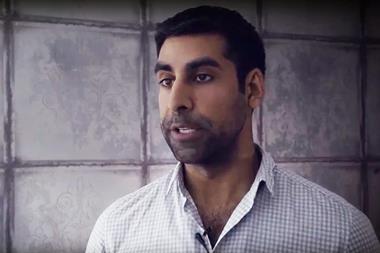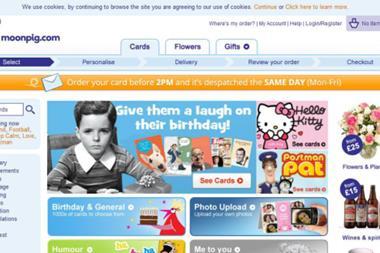Moonpig’s boss James Sturrock is determined to keep innovation at the heart of the business as it celebrates its 15th anniversary this year.
Over lunch in the Mark Hix restaurant next to the company’s London office, Sturrock identifies two key challenges he is trying to fight. “One is being boring and the other is the traditional way of buying cards in-store,” he says.
Sturrock was promoted to managing director of Moonpig in May of this year and comes from a family of retailers.
Ironically Sturrock’s parents run the independent Palmers Department Store in Norfolk and it is this very traditional type of retail that Sturrock is now attempting to battle against at the helm of the etailer.
“We have two competitors. One is boring and the other is the traditional way of buying cards in-store”
James Sturrock, Moonpig
Despite the rise in ecommerce, it has not caused the same shockwaves in card retailing as it has in other areas.
Card Factory, for instance, is recording relatively modest growth in its ecommerce sales and believes they will never make up a huge proportion of total sales.
“Customers are creatures of habit and as a consumer we love convenience. When doing a grocery shop and you remember it is someone’s birthday then why wouldn’t you grab a card?” says Sturrock. “Our job is to convince people there is a different, better way of doing it.”
Pioneering enterprise
Moonpig was a trailblazer in UK ecommerce when it was founded 15 years ago by Dragons Den star Nick Jenkins. The company got its unusual name from Jenkins’ nickname at school. He sold the company for £120m in 2011 and now, in its current form, Sturrock is attempting to find ways to keep the company ahead of the competition.
Moonpig’s core business is personalised cards and Sturrock believes those are growing quicker than the overall card market.

Sturrock says there is “loads more headroom” for growth. British consumers currently buy around 18 cards a year. Sturrock believes only one or two of those 18 are personalised cards and he says his job is to increase that to four, five or six personalised cards out of 18.
He believes this is possible through innovations around later delivery cut-offs and improvements to its apps and the reminders it sends.
For instance, Moonpig has extended its cut off-time to 7pm to appeal to those who have left the card and gift buying to the last minute.
“In ecommerce product and price differentiation isn’t enough anymore,” says Sturrock. “Service is becoming so incredibly important with Amazon and Argos launching same day deliveries.”
Moonpig charges 95p for its late cut-offs, only 32p more than a first-class stamp.
“In ecommerce product and price differentiation isn’t enough anymore. Service is becoming so incredibly important”
James Sturrock, Moonpig
In order to compete in the growing logistics war Moonpig owner Photobox has hired its first group-wide shipping director.
“You would be naïve to think just building better products is going to provide success in retail because ultimately we are all competing with Amazon,” says Sturrock. “Customers have very high expectations now.”
New competitors
Sturrock dismisses the notion that new kids on the block such as Touchnote are a threat to his business and instead thinks their rise is only a good thing for Moonpig. Touchnote enables users to turn pictures stored on their phone into postcards that they can then send to family and friends.
“I love the Touchnote app – it is a really slick experience and customers love it – as far as I’m concerned with other so-called competitors in the market doing nice things raises awareness of different ways of sending a greetings or post cards and helps our industry grow,” says Sturrock.
He also claims Moonpig sales increase whenever rival Funkypigeon.com is advertising on the television due to the increased awareness of online card retailers.
The shift to mobile is also a trend that is benefitting Moonpig, which has seen mobile orders grow 30% year on year, as customers increasingly buy on the move.
It is no doubt such impressive growth figures that made Moonpig and its owner PhotoBox an attractive proposition to private equity businesses Exponent and Electra, which agreed to buy the company for £400m earlier this week.
Sturrock, who was speaking before the deal, would not be drawn on the acquisition speculation.
Looking ahead
Moonpig has brought its mobile app development in-house as it seeks to improve its mobile offering and improve the speed and integration of m-commerce.
“The battle used to be share of wallet and footfall and now it is share of screen. We really needed control of that”
James Sturrock, Moonpig
“The battle used to be share of wallet and footfall and now it is share of screen,” says Sturrock. “We really needed control of that.”
Sturrock added that the decision to keep things in-house also helps keep “the entrepreneurial feel” even though Moonpig is “growing a lot” and now has over 100 staff.
A post-lunch tour of its trendy office in a warehouse conversion proves the company feels more like a start-up rather than a traditional retailer.
In a tough market that is still dominated by physical retail, Moonpig will have to keep innovating fast to prove customers are better off shopping online than buying a panic purchase in a service station.
No matter the outcome, Sturrock is determined the journey won’t be boring.


























No comments yet